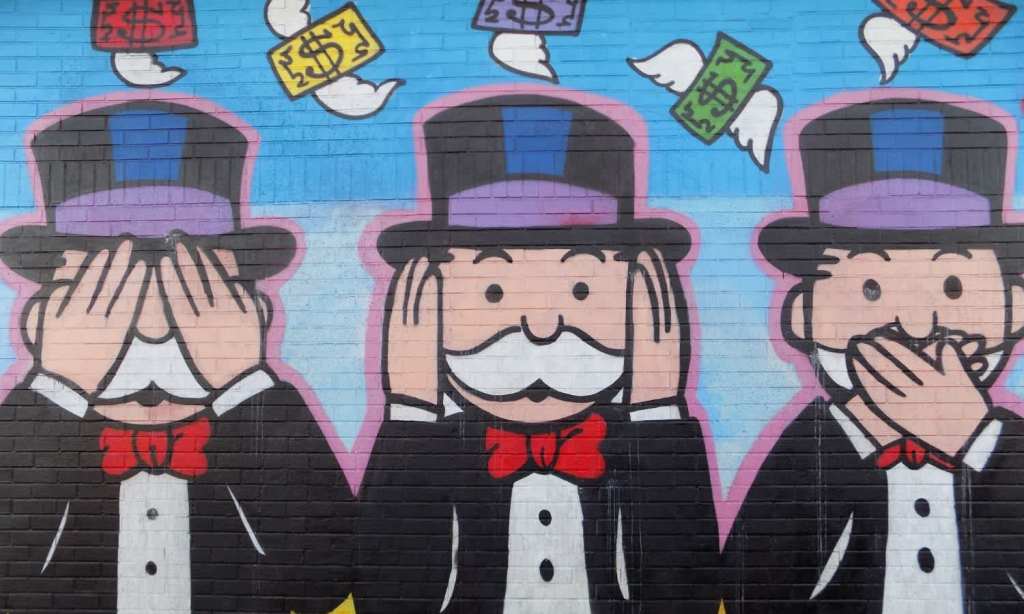Have you ever wondered why those blue Monopoly tiles are so exclusive-feeling, so expensive? Regardless of what they mean, if we’re competitive players, we all want a slice of that blue money.
Although it isn’t a surprise that Monopoly was based on real-life real estate, many of us probably haven’t thought about the extent of division that the hierarchy of prices represents.
How Monopoly’s pricing came to be
It all started with Jesse Raiford, a big-time realtor in Atlantic City, New Jersey. He loved playing the then-called “the landlord’s game” back in the 1930s and when he was introduced to the game by his wealthy friends Cyril and Ruth Harvey. Together, they drew the first Atlantic City Monopoly Board, complete with Atlantic City street names and pricing. In Atlantic City, as in much of the United States, that hierarchy continues to reflect a bitter legacy of racism, classism and geographic segregation, as a new article from The Atlantic outlines.
With the Harveys living on Pennsylvania Avenue (a $320 green property), their friends the Joneses living on Park Place ($350) and the Raiford’s on Ventnor Avenue ($110), they represented the people living in Atlantic City’s most expensive suburbs in the 1930s. The areas they lived in had high walls, high fences, many locks, bars and racial covenants that excluded Black citizens. When it came to the poorer suburbs and low-income Black neighbourhoods, the friends coloured the board brown and priced them at $60 – the cheapest properties on the board.
Being from a socially elite circle, the friends naturally reflected the real estate hierarchy that favoured them with pride. They shared the game with as many family members and friends that they could find, spreading the segregation of Black citizens and the exclusivity of wealth in abundance.
Basically, this iteration of “the landlord’s game”, symbolised the racist and classist segregation led by the white elite. It was a game they played together after dinner, a game that they almost certainly laughed at over glasses of cognac, cigar smoke wafting through rooms almost certainly outfitted in the finest wares. They were laughing because they were in power, they were laughing at the expense of other people. Other people that were not only different to them, but at an obvious socio-economic advantage.
Atlantic City segregation
Atlantic City was a sign of freedom for over 6 million Black Americans who left the Jim Crow South seeking new opportunities in the North during the Great Migration. They were moving to the North hoping to leave behind the discrimination they’d endured in the South, only to find that the racist ideals they sought to escape were almost impossible to eschew.
As modern players of what we now know as Monopoly, most of us have been invited to “build a house on Mayfair”, but in the real world, these places were playgrounds only for the privileged.
As the article in The Atlantic shows, Black residents and tourists were allowed to work at high-end hotels in Atlantic City but they weren’t allowed to dine or lodge there. Some of the hotels even offered white guests the option of only having white staff tend to them. Black employment was basically only found in the tourist industry, as political jobs were reserved for white residents.
A new beginning
When we think about the origins of one of the most successful board games of all time, most of us know it as being created for teaching purposes — which is partly true for Monopoly. In 1904, Washington DC game designer Elizabeth Magie received a legal patent for the game of Monopoly. It’s a much nicer story, to be fair. Magie was a passionate suffragette and fought to ‘patent’ “the landlord’s game”, which basically means to buy the rights to the invention; to legally adopt it.
She wanted to expose the “system of land-grabbing with all its usual outcomes and consequences” and use the symbol of greed as a protest against big monopolists of her time – capitalism circa the 20th Century. Go Magie.
Luckily, versions of Magie’s game won out over Atlantic City’s socialites and here we are today, talking about the very things she wished to fight against.
Read more stories from The Latch and subscribe to our email newsletter.







